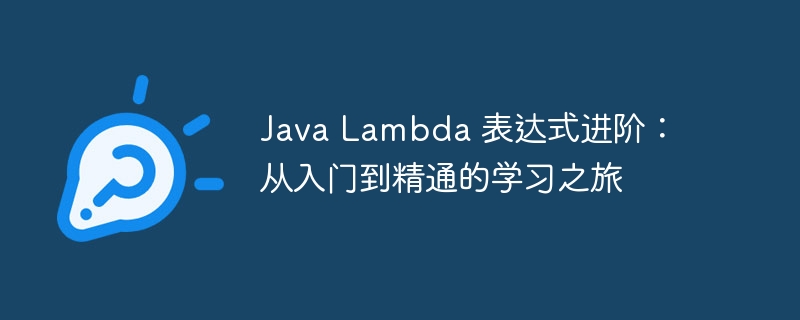Home >Java >javaTutorial >Java Lambda Expression Advanced: A Learning Journey from Beginner to Mastery
Java Lambda Expression Advanced: A Learning Journey from Beginner to Mastery
- PHPzforward
- 2024-02-26 09:40:261236browse

Java Lambda expression is an important feature introduced in Java 8, which can simplify code and improve development efficiency. During the learning journey, we will gradually master the various usages and techniques of Lambda expressions from beginner to proficient. This tutorial is carefully written by PHP editor Yuzai. It aims to help readers systematically learn Java Lambda expressions, deeply understand the ideas of functional programming, and apply it to actual projects to improve programming skills. Let’s start this wonderful learning journey together!
Lambda expression is an anonymous function that allows you to define a function without declaring a method. The syntax of lambda expression is as follows:
(parameters) -> expression
Among them, parameters is the parameter list of the function, and expression is the body of the function. For example, the following Lambda expression calculates the sum of two numbers:
(a, b) -> a + b
2. Advantages of Lambda expression
Lambda expressions have the following advantages:
- Conciseness: Lambda expressions are more concise than traditional methods because they allow you to define a function without declaring a method.
- Strong expressiveness: Lambda expressions are highly expressive and support a variety of operations, including function arraycombination, filtering, mapping, etc.
- Strong versatility: Lambda expressions can be used in various scenarios, including event processing, data processing, algorithm implementation, etc.
3. Usage scenarios of Lambda expressions
Lambda expressions can be used in various scenarios, including:
- Event processing: Lambda expressions can be used to handle various events, such as button click events, mouse movement events, etc.
- Data processing: Lambda expressions can be used to process various data, such as filtering data, mapping data, sortingdata, etc.
- Algorithm implementation: Lambda expressions can be used to implement various algorithms, such as sorting algorithms, search algorithms, encryption algorithms, etc.
4. Things to note about Lambda expressions
When using Lambda expressions, you need to pay attention to the following points:
- Lambda expressions can only access final variables: Lambda expressions can only access variables that have been determined at the time of definition, that is, final variables.
- Lambda expressions cannot modify final variables: Lambda expressions cannot modify variables that have been determined at the time of definition, that is, final variables.
- Lambda expressions cannot use the
thiskeyword: Lambda expressions cannot use thethiskeyword because it has no associated object.
5 Conclusion
Java Lambda expressions are a powerful tool that can help you write cleaner, more expressive code. This article introduces the basic syntax, advantages, usage scenarios and precautions of Lambda expressions. I hope it will be helpful to your learning.
If you want to learn more about Java Lambda expressions, you can refer to the following resources:
- Java official documentation: https://docs.oracle.com/javase/tutorial/lambda/
- Lambda ExpressionsTutorial: https://www.tutorialspoint.com/java8/java8_lambda_expressions.htm
- Lambda expression example: https://github.com/winterbe/java8-tutorial/tree/master/lambdas
The above is the detailed content of Java Lambda Expression Advanced: A Learning Journey from Beginner to Mastery. For more information, please follow other related articles on the PHP Chinese website!
Related articles
See more- Basics of WeChat Mini Program Development: Callback Functions, Anonymous Functions, and Closures (4)
- What should I do if Vue dynamically adds element click events that don't work?
- Comparative analysis of functional programming and OOP in Golang functions
- How to use v-on:click.right to implement the right mouse click event in Vue
- how to repair lsp

